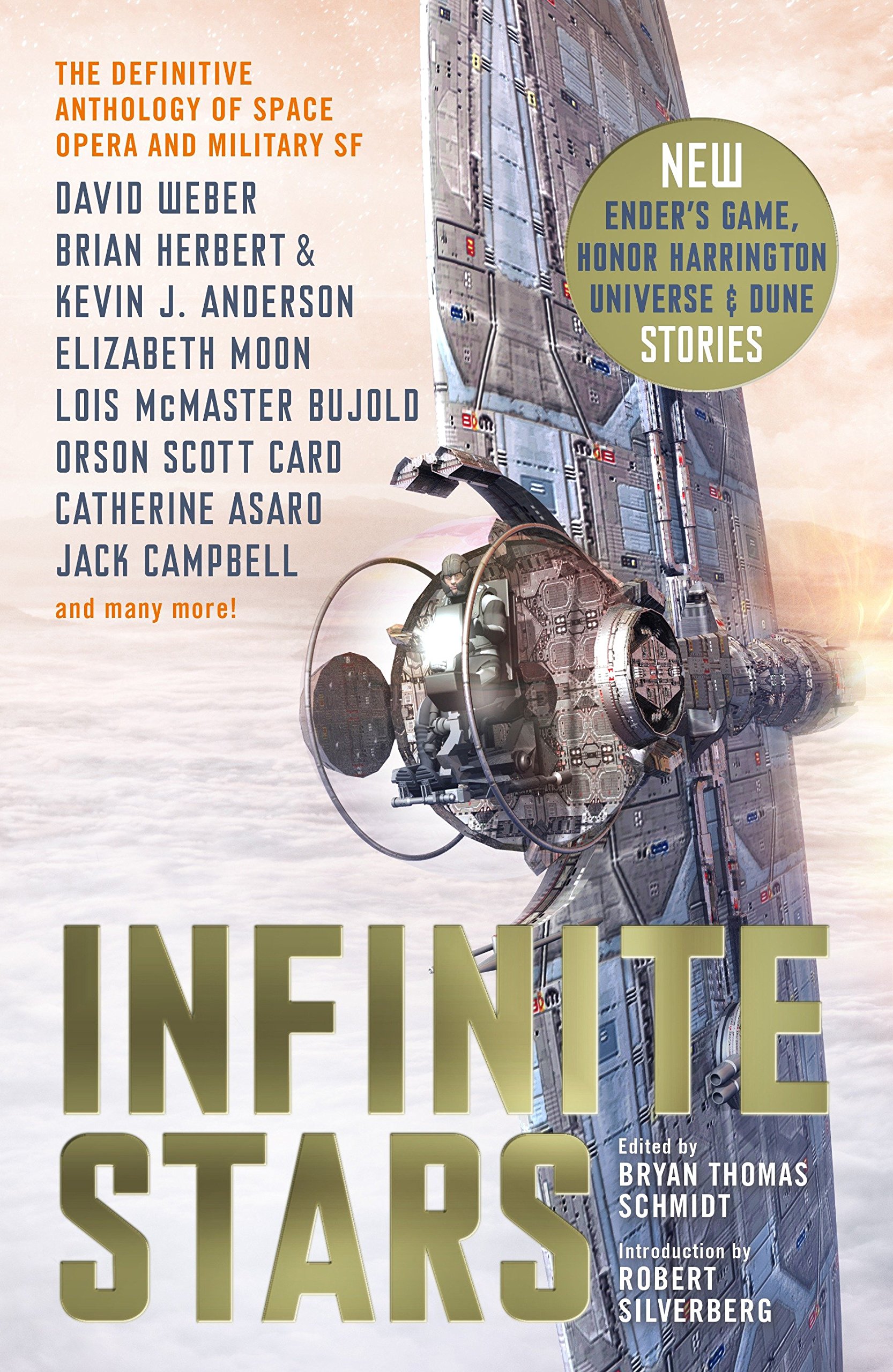
Infinite Stars, edited by Bryan Thomas Schmidt
Words By Johnny Caputo
“Stinking.” “Outworn.” “Grinding.” “Hacky.”
These are the words science fiction novelist Wilson Tucker used in 1941 to describe the sci-fi subgenre known as space opera, which, since its glory days in the mid-twentieth century, has been characterized by its penchant for galaxy-spanning civilizations, melodramatic plots, and one-dimensional characters.
Harsh.
With such a scathing judgment, why would anyone want to pick up Infinite Stars, a 688-page anthology of nothing but space opera novellas and short stories? Well, space cadets, because the stories collected here are anything but your grandaddy’s sci-fi.
Infinite Stars collects 24 stories—10 reprints and 14 original tales—that, taken together, create a multidimensional amalgamation of literary styles. Editor Bryan Thomas Schmidt skillfully melds classic space opera tales from twentieth century masters—some of which are set in well-known fictional universes such as Ender’s Game and Dune—with original stories from the next generation of great science fiction writers. The collective effect of this combination is a sort of rift in the space-time continuum, through which the reader is privileged to view the genre’s storied past, bask in its complex present, and celebrate a future that challenges the genre’s colonial traditions.
One of the classic stories included in this collection is “Stark and the Star Kings,” written by the pioneer 1940s husband-and-wife duo Leigh Brackett and Edmond Hamilton. Told in lyrical, almost psychedelic prose, the story relates Eric John Stark’s journey 200,000 years into the future to combat a dark and ethereal force of nature that threatens to destroy the entire universe. It’s true beauty comes from the subversive plot decisions Brackett and Hamilton make about the nature of this threatening force; this villain is no solipsistic, power-hungry alien conqueror bent on grinding the free peoples of the universe under his boot heel. No, this force is something else entirely. Something the universe has never seen before. Something almost…innocent. As Eric John Stark struggles with this gnawing moral quandary, the reader becomes invited into his inner world, revealing a character who is much more than a square jaw and a photon blaster. We see a man struggling to come to grips with the very nature of reality.
Another standout story in the collection is “Renegat” by Orson Scott Card. Set in the Ender’s Game universe, “Renegat” tells the story of 25-year-old Andrew “Ender” Wiggin, and how he must solve the mystery of who murdered Kenneth Argon, a prominent scientist on the remote colony of Catalunya. Before his death, Argon had been researching whether or not the llops, wolf-like animals native to Catalunya, should be deemed sentient. The story includes all the thematic hallmarks of Card’s intelligent writing style. When is colonization justified? What determines whether a being is sentient or not? What power structure gets to make such decisions? And what happens if that power structure is corrupt? This thought-provoking story is a prime example of the political commentary and thematic complexity that have become almost synonymous with space opera.
“Binti” by Nnedi Okorafor is African futurism at its finest. The titular character is the first person from her tribe to attend Oomza Uni, the galaxy’s premier university. With the wounds of being ostracized by her family still fresh, she boards the ship to Oomza Uni. But Binti doesn’t have long to wallow in her grief, because the ship is promptly taken over by a hostile alien force known as the Meduse. Binti’s best tool in surviving the alien hijacking is not a taser gun or a plasma shield, but rather her innate ability as a harmonizer to see the mathematical relationships between all living beings, including her and the Meduse. This story flips the well-worn trope of violent alien conflict on its head by favoring a more nuanced exploration of the danger and beauty of connecting with the unknown.
After reading this volume, even the most grounded reader will be able to see that space opera has blasted off from its formulaic and predictable pulpy roots to explore galaxies of carefully crafted prose, thematic depth, and character complexity. These stories beg the reader to question the very nature of reality and gaze in wonder at the universe, pondering the struggles and joys of humans who seek to find their place in it—which is lightyears away from anything “stinking,” “hacky,” and “outworn.”